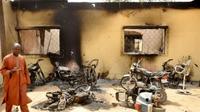-
Nigeria wants Cameroon’s help on Islamic insurgency

Nigeria has a problem: in the face of growing military campaign by the federal government against Islamist insurgents n three states in north-east Nigeria, some of the insurgents have found it safer to relocate to neighboring Cameroon. They launch their attacks against targets in north-east Nigeria – then retreat to the safety of Cameroon, where they know the Nigerian military will not pursue them. Nigeria wants Cameroon to take a more active role in preventing Islamist insurgents from using Cameroon’s territory as a safe haven.
-
-
No evidence al -Qaeda was involved in Benghazi attack: NYT report

In the most detailed examination to date of the origins of the 2012 attack on the U.S. Benghazi facility, the New York Times, in a 6-part, 8,000 word in-depth report found no evidence that al Qaeda or any international terrorist groups played any role in the attack. The report says that a crude anti-Muslim video, made by an Egyptian with a checkered past now residing in California, in large part fueled the attack. The report says that the attack was not well-planned, but that it also was not a completely spontaneous reaction to the video. The report says that those who argue that al Qaeda was involved in the attack are confusing local extremist organizations like Ansar al-Shariah for al Qaeda’s international terrorist network.
-
-
Arafat died of natural causes, not radiation poisoning: Russian investigators
A team of Russian physicians and scientists investigating the 11 November 2004 death of Palestinian leader Yasser Arafat has concluded that his death was not caused by radiation poisoning. The conclusions of the Russian team are a blow to the Palestinian leadership, which, since 2004, has accused Israel of being behind Arafat’s death. The Russian team’s findings follow the findings of two other scientific investigative teams: a Swiss medical team, funded by Arafat’s widow, concluded that the radiation poisoning of Arafat could not be ruled out. The French scientific team, appointed by a French judge, concluded that the levels of polonium-210 in Arafat’s personal effects, and the complete absence of the radioactive isotope in his body tissues, made it impossible for Arafat to have been poisoned by polonium. The Russian team, hired by the Palestinian authority, reached the same conclusion the French team did. “It was a natural death; there was no impact of radiation,” Vladimir Uiba, the head of the Russian Federal Medical and Biological Agency, said.
-
-
Egypt designates Muslim Brotherhood a terrorist organization
Accusing the Muslim Brotherhood of being behind a Tuesday car-bomb attack on the police headquarters in the Niles Delta city of Mansoura, an attack which killed sixteen people and wounded more than 100, the Egyptian government on Wednesday designated the Muslim Brotherhood a terrorist group, thus making it a state crime not only to take part in the movement’s activities and contribute money to it, but criminalizing even registering for membership in the organization.
-
-
Student cannot sue TSA, FBI agents over airport detention for Arabic flashcards
A student detained at Philadelphia International airport over his Arabic flashcards cannot sue the individual TSA and FBI agents who held him in custody, an appeals court has ruled. The student, double-majoring in physics and Middle Eastern studies, carried Arabic-English flashcards in his backpack. Most of the cards carried everyday words such as “nice”, “sad,” and “friendly.” Some of the cards, however, included words like “bomb,” “terrorist,” and “explosion.” Chief Judge Theodore McKee of the Third Circuit Court of Appeals in Philadelphia noted that the student clearly had the right to have the materials, but “it is simply not reasonable to require TSA officials to turn a blind eye to someone trying to board an airplane carrying Arabic-English flashcards with words such as ‘bomb,’ ‘to kill,’ etc.” He added: “Rather, basic common sense would allow those officials to take reasonable and minimally intrusive steps to inquire into the potential passenger’s motivations.”
-
-
Not all questions about the Tsarnaev brothers have been answered

What caused Tamerlan and Dzhokhar Tsarnaev to plant two bombs at the Boston Marathon finish line continues to puzzle investigators. Understanding the information which was available to local and federal law enforcement authorities before and after the attack might help prevent a future attack.
-
-
U.S. nuclear weapon programs to cost $355 billion over a decade: CBO
In its most recent review of U.S. nuclear policy, the Obama administration decided to maintain all three types of systems that can deliver nuclear weapons over long ranges — submarines that launch ballistic missiles (SSBNs), land-based intercontinental ballistic missiles (ICBMs), and long-range bombers — known collectively as the strategic nuclear triad. The administration also decided to preserve the ability to deploy U.S. tactical nuclear weapons carried by fighter aircraft overseas in support of allies. Nearly all of these delivery systems and the nuclear weapons they carry are nearing the end of their planned operational lives and will need to be modernized or replaced by new systems over the next two decades. The Congressional Budget Office (CBO) estimates that between 2014 and 2023, the costs of the administration’s plans for nuclear forces will total $355 billion.
-
-
How effective are renewable energy subsidies? It depends
Renewable energy subsidies have led to explosive growth in wind power installations across the United States, especially in the Midwest and Texas. Electricity produced by wind is emission free, so the development of wind-power may reduce aggregate pollution by offsetting production from fossil fuel generated electricity production. Emission rates of fossil fuel generators, however, vary greatly by generator (coal-fired, natural gas, nuclear, hydropower). Thus, the quantity of emissions offset by wind power will depend crucially on which generators reduce their output. In other words, the quantity of pollutants offset by wind power depends crucially on which generators reduce production when wind power comes online.
-
-
Breed-specific legislation does not protect the public from dangerous dogs

Research conducted by animal behavior experts challenges the basis of breed-specific legislation designed to protect the public from “dangerous” dogs.The researchers concluded that rather than making people safer, current legislation in the United Kingdom could be lulling them into a false sense of security.
-
-
Global terrorism increasing, but fewer attacks in Western world
Terrorism touched eighty-five countries in 2012, but just three — Pakistan, Iraq, and Afghanistan — suffered more than half of 2012’s attacks (54 percent) and fatalities (58 percent), according to new data released the other day by the National Consortium for the Study of Terrorism and Responses to Terrorism (START) Global Terrorism Database (GTD). In addition to illustrating a continued shift in location of attacks, the new data — with more than 8,400 terrorist attacks killing more than 15,400 people in 2012 — also show an increase in attacks and fatalities over the past decade. Al-Qaeda central was not directly responsible for any attacks in 2012, but the six deadliest terrorist groups in the world were all affiliated to some extent with the organization. These include the Taliban, Boko Haram, al-Qaeda in the Arabian Peninsula, Tehrik-e Taliban Pakistan, al-Qaeda in Iraq, and al-Shabaab.
-
-
Mississippi to comply with REAL ID
Last Friday, Mississippi joined forty other states and announced it would comply with the REAL ID Act. Forty-one states and territories are fully or partially compliant with REAL ID – of which twenty states are fully compliant.
-
-
Declassified documents strongly argue for keeping NSA programs secret
On Saturday, James Clapper, the Director of National Intelligence, declassified a set of ten court documents which show that both the Bush and Obama administrations assert that that some of the more sensitive NSA surveillance programs should be kept secret. The administration declassified the documents following a court order related to two lawsuits filed the Electronic Frontier Foundation. The Bush and Obama administration strenuously reject the EFF’s charge that they were running a “dragnet surveillance.” Both administrations contend that the collection programs with explicit limits and minimization procedures which effectively protected the Constitutional rights of Americans.
-
-
Maine police uses social media, sponsored apps to fight crime
The accessibility of smartphones and the popularity of apps are making it easier for police to share and receive information from the public. Law enforcement agencies in Maine are using department-managed social media pages to engage with the public. Police department in money also use funds from recovered items and cash seized from drug busts to fund the development of apps which make it easier for the public to communicate with the police and report crimes.
-
-
Deepening ethnic violence in South Sudan may ultimately tear the new country apart

Following last week’s announcement by President Salva Kiir of South Sudan that his government had foiled a coup attempt by his former vice president, Riek Machar, the country has been plunged into uncertainty. Escalating violence has already claimed hundreds of lives in the capital Juba. Thousands have fed the capital, seeking safety in remote rural areas of the country. Kiir belongs to the Dinka tribe which is the largest ethnic group in the country, with about 15 percent of the population. Machar is a Nuer, the second largest group with about 10 percent of the population. In the capital, Dinka-led South Sudanese forces have targeted members of the Nuer ethnic group, killing many and detaining others, including soldiers, lawmakers, and students. Outside the capital, in Jonglei State, Nuer militiamen have been targeting Dinka civilians and attacking oil fields.
-
-
Natural gas saves water, reduces drought vulnerability
A new study finds that in Texas, the U.S. state that annually generates the most electricity, the transition from coal to natural gas for electricity generation is saving water and making the state less vulnerable to drought. Even though exploration for natural gas through hydraulic fracturing requires significant water consumption in Texas, the new consumption is easily offset by the overall water efficiencies of shifting electricity generation from coal to natural gas. The researchers estimate that water saved by shifting a power plant from coal to natural gas is 25 to 50 times as great as the amount of water used in hydraulic fracturing to extract the natural gas.
-
More headlines
The long view
Factories First: Winning the Drone War Before It Starts
Wars are won by factories before they are won on the battlefield,Martin C. Feldmann writes, noting that the United States lacks the manufacturing depth for the coming drone age. Rectifying this situation “will take far more than procurement tweaks,” Feldmann writes. “It demands a national-level, wartime-scale industrial mobilization.”
No Nation Is an Island: The Dangers of Modern U.S. Isolationism
The resurgence of isolationist sentiment in American politics is understandable but misguided. While the desire to refocus on domestic renewal is justified, retreating from the world will not bring the security, prosperity, or sovereignty that its proponents promise. On the contrary, it invites instability, diminishes U.S. influence, and erodes the democratic order the U.S. helped forge.
Fragmented by Design: USAID’s Dismantling and the Future of American Foreign Aid
The Trump administration launched an aggressive restructuring of U.S. foreign aid, effectively dismantling the United States Agency for International Development (USAID). The humanitarian and geopolitical fallout of the demise of USAID includes shuttered clinics, destroyed food aid, and China’s growing influence in the global south. This new era of American soft power will determine how, and whether, the U.S. continues to lead in global development.
Water Wars: A Historic Agreement Between Mexico and US Is Ramping Up Border Tension
As climate change drives rising temperatures and changes in rainfall, Mexico and the US are in the middle of a conflict over water, putting an additional strain on their relationship. Partly due to constant droughts, Mexico has struggled to maintain its water deliveries for much of the last 25 years, deliveries to which it is obligated by a 1944 water-sharing agreement between the two countries.
How Disastrous Was the Trump-Putin Meeting?
In Alaska, Trump got played by Putin. Therefore, Steven Pifer writes, the European leaders and Zelensky have to “diplomatically offer suggestions to walk Trump back from a position that he does not appear to understand would be bad for Ukraine, bad for Europe, and bad for American interests. And they have to do so without setting off an explosion that could disrupt U.S.-Ukrainian and U.S.-European relations—all to the delight of Putin and the Kremlin.”
How Male Grievance Fuels Radicalization and Extremist Violence
Social extremism is evolving in reach and form. While traditional racial supremacy ideologies remain, contemporary movements are now often fueled by something more personal and emotionally resonant: male grievance.
